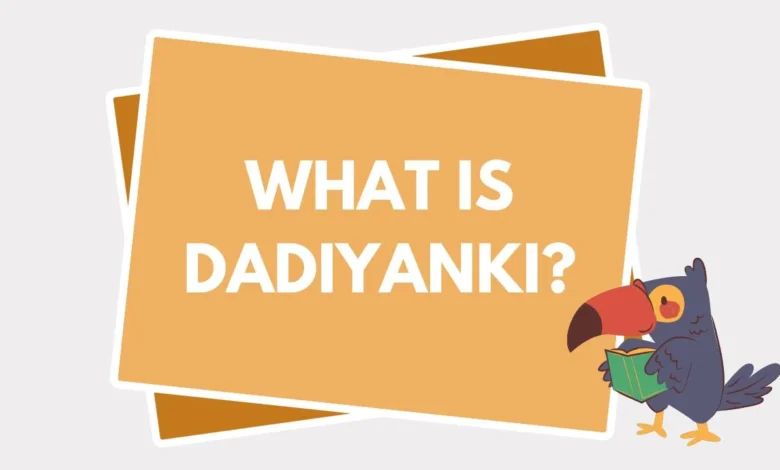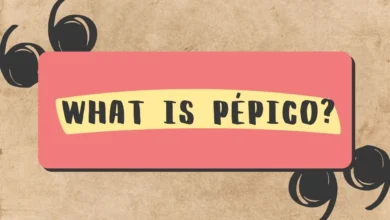What Is Dadiyanki?

Dadiyanki is a term that may not be widely recognized by everyone, but it holds significance in certain contexts. It could refer to a cultural, historical, or personal element that is important to a specific group or region. The word “dadiyanki” might represent a nickname, a phrase, or an event that holds value for certain individuals or communities.
For instance, dadiyanki could be the name of a tradition or custom that brings people together. If it’s a part of a family or community, it might involve stories, rituals, or practices that have been passed down for generations. Understanding the true meaning of dadiyanki depends on the specific context in which it is used. For now, let’s explore what it could mean and why it might be important.
Where Did Dadiyanki Originate From?
The origin of the term dadiyanki is important for understanding its full meaning. If dadiyanki is connected to a cultural practice or event, its roots may come from a certain country, ethnic group, or period in history. Tracing its origins could reveal why it remains relevant today.
Perhaps dadiyanki is linked to a specific region where people hold strong traditions. For example, if it comes from an indigenous group or an ancient civilization, it might have deep historical significance. On the other hand, it could be a modern term created to represent something more recent, like a local festival or a family gathering that became a tradition.
How Is Dadiyanki Celebrated or Remembered?
If dadiyanki is related to a tradition or celebration, there are likely special ways it is observed. People might gather with friends or family to take part in rituals or activities that have been carried on for years. These events might include feasts, dances, storytelling, or other activities that help keep the memory of dadiyanki alive.
Whether it’s a yearly event or something done on special occasions, the celebration of dadiyanki might bring people closer together. It could be an opportunity for families to reconnect and for younger generations to learn about their heritage. Traditions like these often serve as a way to pass down important values and lessons.
What Are the Core Values of Dadiyanki?
The values behind dadiyanki might be at the heart of why it’s so meaningful to those who observe it. If it is a tradition, it may teach lessons about respect, love, family, or unity. These values are often the reasons why traditions like dadiyanki continue through the years.
For instance, dadiyanki might emphasize the importance of community. People may come together to share meals, help one another, and celebrate their shared culture. In this way, dadiyanki becomes not just a celebration but a way of living that prioritizes relationships and collective well-being.
How Has Dadiyanki Evolved Over Time?
Like many traditions, dadiyanki may have evolved with time. While it might have started as a specific practice, changes in technology, culture, and society could have influenced how it is observed today.
For example, if dadiyanki was once celebrated in a village setting, it might now be observed by people who have moved to cities or other parts of the world. This evolution shows how traditions adapt to modern life while still keeping their core values intact. The spread of the internet and social media could also play a role in how dadiyanki is shared and remembered.
Who Participates in Dadiyanki?
Dadiyanki could involve a wide range of people, from close family members to larger communities. If it’s tied to a specific culture, it may be important to that particular group, but outsiders could be welcomed to participate or learn more about it.
People who take part in dadiyanki might feel a strong connection to their roots. It could be a way for them to honor their ancestors and stay connected to their past. Participation in dadiyanki can bring people a sense of belonging and purpose, making them feel like they are part of something bigger.
How Can Someone Learn More About Dadiyanki?
Learning about dadiyanki can be a rewarding experience, especially for those interested in traditions or cultural heritage. Books, documentaries, and oral histories from elders might provide insights into the meaning and significance of dadiyanki.
Additionally, visiting places where dadiyanki is celebrated could offer firsthand experiences. Whether it’s by attending festivals or speaking with those who observe it, people can gain a deeper appreciation for dadiyanki and the values it represents. Engaging with cultural groups and attending events are also excellent ways to learn more.
What Are the Benefits of Preserving Dadiyanki?
Preserving traditions like dadiyanki offers several benefits to both individuals and communities. It helps maintain a connection to the past, allowing future generations to understand where they come from. Keeping dadiyanki alive strengthens cultural identity and can provide people with a sense of pride.
In addition, preserving traditions fosters community bonds. When people come together to celebrate dadiyanki, they build relationships and trust with one another. This collective experience can provide emotional support and create a strong sense of unity.
| Pros of Preserving Dadiyanki | Cons of Not Preserving Dadiyanki |
|---|---|
| Strengthens cultural identity | Loss of valuable traditions |
| Fosters community connections | Weakening of community ties |
| Offers a sense of belonging | Disconnection from past generations |
| Provides valuable life lessons | Fewer opportunities to pass down values |
How Is Dadiyanki Important to Future Generations?
For future generations, dadiyanki represents a link to their history and heritage. As time moves on, it becomes even more crucial to pass down traditions like this. It serves as a reminder of the past while also shaping the future by teaching valuable lessons about respect, community, and togetherness.
By preserving dadiyanki, future generations have the chance to understand their cultural background and continue important customs. It helps them stay connected to their identity and strengthens the ties between families and communities.
Conclusion
Dadiyanki is much more than a word—it could represent a tradition, a celebration, or a meaningful practice that connects people to their heritage. Whether it’s a longstanding event or something that has evolved with time, dadiyanki holds deep value for those who observe it. Through this tradition, individuals and communities can maintain strong relationships, pass down important lessons, and ensure that their cultural identity remains vibrant for future generations.
Understanding dadiyanki allows us to see the importance of traditions in shaping who we are and where we come from. As society changes, keeping these connections alive ensures that the values and stories of the past continue to influence our lives today.




